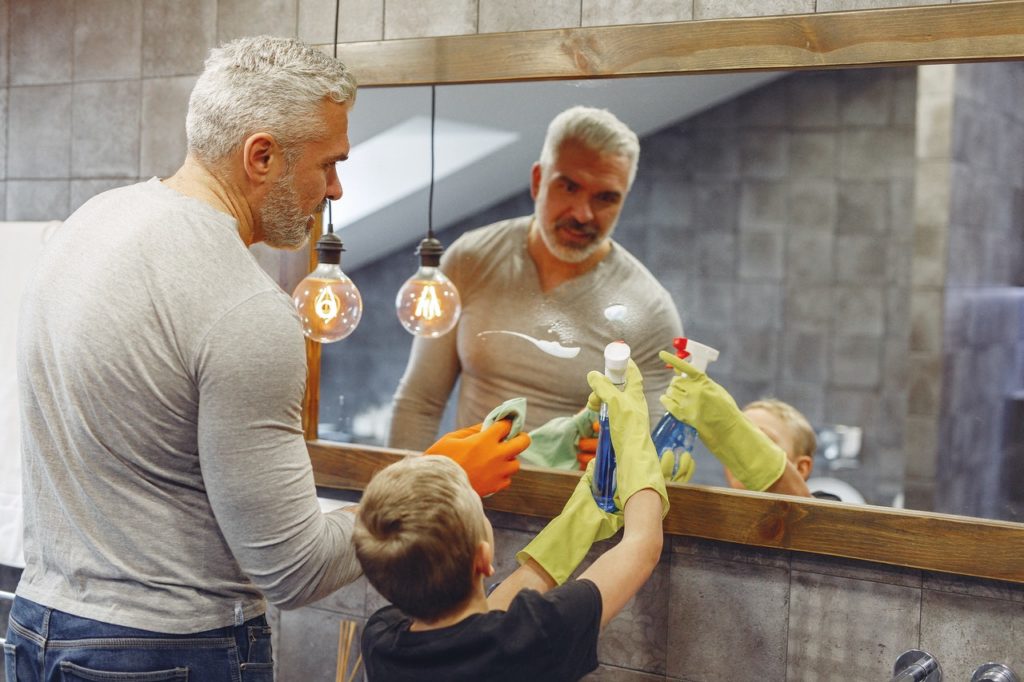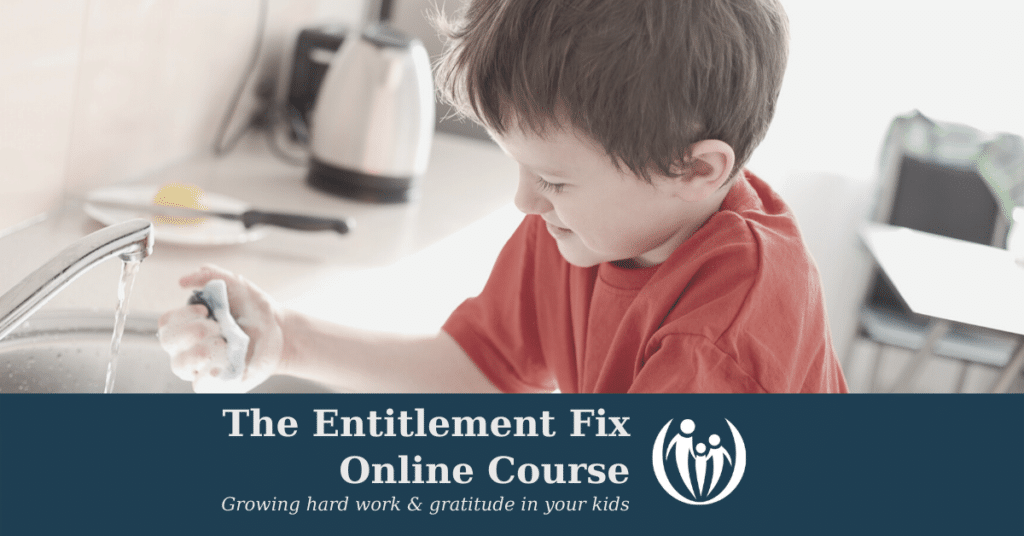
Raising Entitled Kids? Here’s How to Stop.
As soon as kids are capable of doing jobs, take the time to teach them to do the jobs and gracefully hold them responsible to do them.

Raising entitled kids happens quite innocently. After all, your child starts off as a baby.
And babies embody the most rightfully entitled human beings in the world. They’re legitimately entitled to have all their food and bodily needs taken care of, without any effort at helping in the process.
Because they can’t.
But entitled kids? Well… it gets tricky, doesn’t it? Certainly, a young child is entitled to a roof over their heads and a loving adult presence.
Generally when we speak of entitled kids, we’re talking about a child that feels entitled to things that simply aren’t their automatic right.
Like an iPhone. Or sitting on the couch while you set the table.
Those aren’t their rights, and your child has no rightful entitlement to these things.
What you want are empowered kids, not entitled kids. So how did we get here?

American parents are too child-centered, say researchers
Researchers say the problem is American parents are too child-centered. Is making our kids happy eclipsing our determination to teach them responsibility? “Parents intend to develop their children’s independence, yet raise them to be relatively dependent, even when the kids have the skills to act on their own.”
As a result, kids are growing up less prepared to take care of themselves and others than ever before. These entitled kids do not feel inclined to be responsible and helpful as part of daily life.
Lynne and I have encountered this issue time and again in our own work coaching families.
Children didn’t have the option of entitlement in the past
Not so long ago families were different. For nearly all of human history, kids were expected at young ages to do what they could to help their family survive. In other words, their contributions were necessary to keep others afloat.
Things have only moved away from needing children in the last 60 years.
As children and parents shared in the responsibilities of day to day life, families passed faith and values to their children. Every child was an asset, because every child was another worker in the labor force of the family or clan. Kids felt significant not just because parents said ‘I love you’ at bedtime or sent notes in their lunchbox, but because they knew that if they didn’t do their part others would suffer.
This concept of being needed is absent in most American homes today. Instead of growing up to believe they are here for others, kids grow up to believe that others are here for them. Add to the mix a child’s selfish, sinful nature, and we’ve got a real problem on our hands.
Welcome to what some sociologists call the Age of Entitlement.
Once upon a time it was normal for kids to say, “please” and “thank you.” They were conscious of the labor involved in the gifts they received, so gratitude was a natural expression.
Today there’s a common sentiment of, “I deserve what I want, when I want it, without earning it, and I’m bitter if I don’t get it.” Unfortunately, more children believe the world is theirs to manipulate for their own pleasurable purposes.
The way to change this cultural epidemic is to change what happens in our homes.
So how do you raise empowered children who know they are called and capable?

Stop doing for your kids what they’re capable of doing on their own.
You start off with that baby who cannot do anything, but bit-by-bit they become capable.
- Maybe your toddler starts bringing dirty silverware to the sink (with a loud raucous of applause from the rest of the family).
- Maybe your preschooler stands at the sink and scrubs dishes (even if you have to scrub them again later).
- Maybe your 7-year-old plays with the baby for a few minutes, so you can take a conference call.
As soon as your child is capable, give them jobs—jobs that if not done will negatively impact other people. As much as possible, set up systems and structures that truly depend on your child’s participation. Being needed gives kids a healthy sense of significance and purpose.
No, they won’t do them perfectly. This is part of the learning process, but help your child experience the success of a completed job.
Help them understand how much their contribution matters to the family. Because when kids use their talents in ways that bless others, they begin to find their way into the purposes God created them for.
This sounds obvious, but why is fighting entitlement in our kids so hard?
Unfortunately, even parents who agree with the problem and the solution often spoil their kids. They cook for kids who are capable of cooking. They clean for kids who are capable of cleaning. They wash clothes, shop, buy, and even speak for their kids.
Why?
In the kids’ younger years it’s more efficient to do the stuff instead of teaching our kids to do it. It takes much longer to grocery shop in ways that involve our kids. You might have to grit your teeth over that missed spot in the lawn. Or the dishes don’t get put away the way you like it, when they do it.

As your kids get older and more capable, you keep doing all the work, because the fight to get your now entitled kids involved just isn’t worth it.
It’s hard to stop entitlement.
The consequence of not dealing with entitled kids
If you don’t quit, though, things will continue to get worse—both for you and your kids.
In the name of “taking good care” of their kids, many parents have become little more than service providers. And they unknowingly teach their kids to become masterful, manipulative consumers of those services.
These children know how to avoid taking responsibility, but they don’t know how to own responsibility when it would be a blessing to them.
The message parents send is, “You are not responsible for your own life. Someone else is.” And as kids learn this message, they grow up expecting others to take care of them and their messes.
Like scholarships. Or relationships. Or roles in a pageant.
They miss out on the joy of knowing they finished a task well and blessed others in the process.
Breaking the pattern of entitlement gets practical

There’s a cost to teaching responsibility.
- Are you willing to take the time now to train your two-year-old to set the table? Even if a few dishes are broken.
- Are you willing to give a five-year-old the responsibility of preparing and serving breakfast? Even if they spill the milk.
- Are ready to give your ten-year-old the job of mowing the lawn? Even if they miss a patch of grass.
Of course, if you’re in your easy chair scrolling through your phone while your child works, they will likely become bitter.
But you could use that time to bless someone else—even someone outside the family. Then tell stories about how everyone’s contributions blessed others. You’ll be well on your way to developing a strong sense that your family works together to bless each other and others.
If you’re ready to begin, talk to your kids

It might be time to hold a family meeting on the problem of entitlement. You might gracefully explain it a little like this:
- “I believe you kids are capable of so much more than I’ve given you to do.”
- “We’ve been doing a lot of things for you, and I’m sorry. We have robbed you of the opportunity to learn responsibility.”
- “We’ve decided we’re going to change and start entrusting you with more of how our family blesses each other and others.”
- “Do you have any ideas on how we can start doing this better? Are there any responsibilities you want to own?”
- “We have written down some of the responsibilities in the home that we want you to take over. Do you want to sign up for them or have us assign some to you?”
Entitlement won’t end with the first conversation
Don’t forget: Follow through.
The older your kids, the more you should expect resistance. But it’s better to start now than when they start job hunting.
So make the plan clear. Calmly and gracefully state your plan. Ask the kids which parts they think will be the hardest to learn, and work together on solutions.
Remember, you are empowering your kids to grow in independence. You are also communicating two powerful messages all children long to hear and learn: “You are capable, and you are responsible.”

So get to work inviting your kids to join you in being a blessing to others. It may be the most important thing you can do to combat selfish entitlement and grow a healthy sense of significance.
Still unsure how to help your entitled kids? There’s a course for that.
We know a single blog post won’t solve all your entitlement issues. Developing a new family culture around blessing others isn’t easy.
The good news? We’ve developed an e-course for that.
Register for The Entitlement Fix: Growing Hard Work and Gratitude In Your Kids!
This fast-paced 4-session course is designed to give parents a solid strategy for stamping out entitled attitudes and moving toward greater meaning in life.

You’ll learn to take your kids through a simple process for helping your family have constructive conversations about rights, responsibilities, and privileges in your home. You’ll learn graceful responses to the inevitable conflict that emerges when parents confront selfishness. Most importantly, you’ll learn a perspective that grounds all your efforts in eternal truths from the Bible.
Join us today! At $35, we believe this is a fantastic value. If this is still out of your reach, simply contact us for a scholarship.







